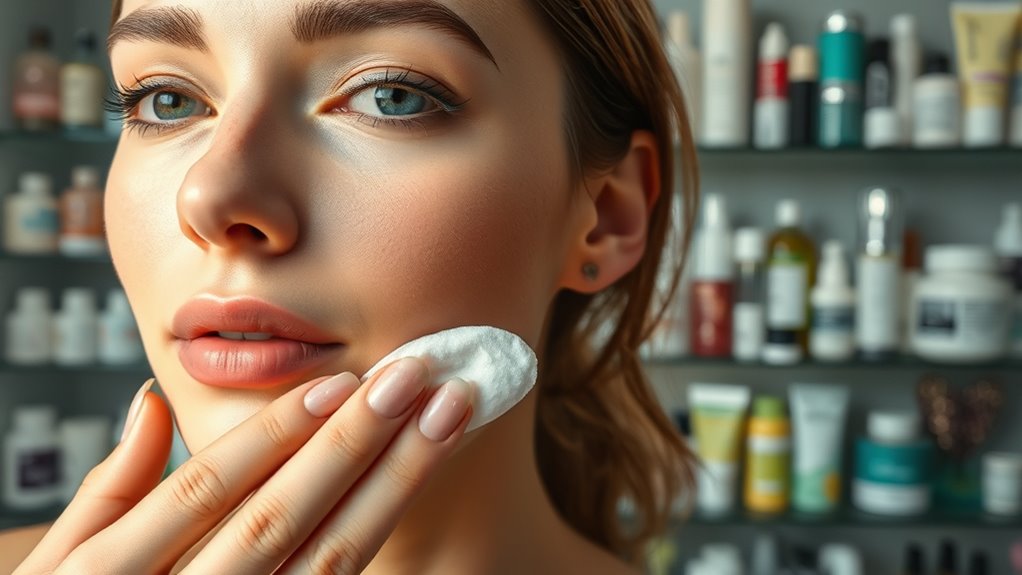This One Step Could Be Ruining Your Skin Without You Knowing It
Exfoliating too often can seriously damage your skin without you realizing it. Signs like redness, sensitivity, and dryness indicate over-exfoliation, which strips your skin of its natural oils. Skipping exfoliation altogether isn’t the answer either, as it leads to clogged pores and dull-looking skin. Finding the right exfoliation method tailored to your skin type is crucial. To learn how to effectively restore your skin health after potential over-exfoliation, keep exploring the best practices.
Understanding Exfoliation and Its Importance
Exfoliation plays a crucial role in maintaining healthy skin, as it removes dead skin cells and promotes the regeneration of new ones.
A common skincare mistake is over-exfoliation, which can strip your skin of natural oils, leading to irritation and sensitivity.
Balancing your exfoliation routine is essential, ensuring you enhance skin texture without causing damage.
Understanding this process is key to achieving vibrant skin. Recognizing over-exfoliation can help you avoid potential damage to your skin barrier.
Common Signs of Over-Exfoliation
Recognizing the signs of over-exfoliation can help you protect your skin from damage. Common indicators include redness, increased sensitivity, and dryness. Pay attention to these symptoms to maintain a healthy complexion. One important factor to consider when evaluating your exfoliation routine is how often you use different types of exfoliators, as this can greatly influence your skin’s reaction.
| Sign | Description |
|---|---|
| Redness | Inflamed, irritated skin |
| Increased Sensitivity | Unusual reactions to products |
| Dryness | Flakiness and rough texture |
The Impact of Inadequate Exfoliation
When your skin doesn’t receive adequate exfoliation, you may experience a buildup of dead skin cells that can lead to various issues. This accumulation clogs pores, resulting in breakouts and dullness. Moreover, inadequate exfoliation hampers cellular turnover, preventing your skin from achieving a smooth, radiant appearance. Over time, this neglect can contribute to uneven texture and signs of premature aging. Implementing regular exfoliation methods helps to clear away this buildup and reveal fresher, healthier skin.
Finding the Right Exfoliation Method for Your Skin
Neglecting proper exfoliation can hinder your skin’s health, making it vital to find a method that suits your unique needs.
Evaluate your skin type—whether it’s oily, dry, or sensitive—before choosing between physical, chemical, or enzymatic exfoliation.
Each method offers distinct benefits; thus, understanding your skin’s response will ensure you achieve the desired results while minimizing irritation and damage. Additionally, skincare routine mistakes can exacerbate skin issues, so being aware of common pitfalls is essential for maintaining a healthy glow.
Best Practices for Healthy Exfoliation
Although exfoliation is crucial for maintaining healthy skin, it’s equally important to follow best practices to avoid overdoing it.
Begin by exfoliating once or twice a week, depending on your skin type. Choose gentle products with natural ingredients.
Always moisturize afterward, and don’t forget sunscreen, as exfoliated skin can be more sensitive. Additionally, be aware that using products that don’t match your skin type can lead to irritation or less effective results.
Monitor your skin’s response and adjust frequency as needed for optimal results.
How to Restore Skin Health After Over-Exfoliation
Many people underestimate the impact of over-exfoliation on their skin’s health. To restore balance, prioritize hydration, avoid harsh products, and incorporate soothing ingredients. Focus on barrier repair and gentle care. Here’s a quick summary of effective steps:
| Step | Action | Purpose |
|---|---|---|
| Hydrate | Use a rich moisturizer | Locks in moisture |
| Soothing ingredients | Apply aloe vera/ceramides | Reduce irritation |
| Gentle cleanser | Switch to a mild formula | Restore pH balance |
Restoring your skin’s barrier is crucial after over-exfoliation, as a compromised skin barrier can lead to increased sensitivity and breakouts.

